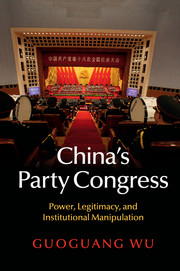Crossref Citations
This Book has been
cited by the following publications. This list is generated based on data provided by Crossref.
Truong, Nhu
2017.
Institutions Without Belief: Incalculability and Legitimate Domination Under the Chinese Communist Party.
Asian Politics & Policy,
Vol. 9,
Issue. 4,
p.
636.
Joannidès de Lautour, Vassili
2018.
Strategic Management Accounting, Volume II.
p.
91.
Snape, Holly
2019.
Party Leadership and Legislating: Party Documents Through a Party–State Relationship Lens.
Chinese Law & Government,
Vol. 51,
Issue. 5-6,
p.
299.
Lu, Fengming
and
Ma, Xiao
2019.
Is Any Publicity Good Publicity? Media Coverage, Party Institutions, and Authoritarian Power-Sharing.
Political Communication,
Vol. 36,
Issue. 1,
p.
64.
Wu, Zhihuan
Li, Lei
Li, Yuntao
and
Gao, Yongming
2019.
Simulation of two-satellite reconnaissance system with intelligent decision based on object detection.
p.
2130.
Zhang, Tony Huiquan
2019.
THE RISE OF THE PRINCELINGS IN CHINA: CAREER ADVANTAGES AND COLLECTIVE ELITE REPRODUCTION.
Journal of East Asian Studies,
Vol. 19,
Issue. 2,
p.
169.
Gao, Xingmin
and
Guo, Qin
2019.
Annual Report on The Development of China's Special Economic Zones (2017).
p.
123.
Tsai, Wen-Hsuan
and
Zhou, Wang
2019.
Integrated Fragmentation and the Role of Leading Small Groups in Chinese Politics.
The China Journal,
Vol. 82,
Issue. ,
p.
1.
Wu, Guoguang
2020.
Challenges of Globalization and Prospects for an Inter-civilizational World Order.
p.
241.
Snape, Holly
and
Wang, Weinan
2020.
Finding a place for the Party: debunking the “party-state” and rethinking the state-society relationship in China’s one-party system.
Journal of Chinese Governance,
Vol. 5,
Issue. 4,
p.
477.
Liao, Xingmiu
and
Tsai, Wen-Hsuan
2020.
Strengthening China’s Powerful Commission for Discipline Inspection under Xi Jinping, with a Case Study at the County Level.
The China Journal,
Vol. 84,
Issue. ,
p.
29.
Li, Tao
2020.
DECLINING LEGISLATIVE DISSENT IN CHINA: EVIDENCE FROM NATIONAL AND PROVINCIAL PARTY CONGRESS ELECTIONS.
Journal of East Asian Studies,
Vol. 20,
Issue. 2,
p.
231.
Thornton, Patricia M.
2021.
Of Constitutions, Campaigns and Commissions: A Century of Democratic Centralism under the CCP.
The China Quarterly,
Vol. 248,
Issue. S1,
p.
52.
Miaomiao, Tian
Peng, Huang
Guangbin, Ma
Wei, Li
and
Xiaomu, Li
2021.
Intelligent Management of Satellite Ground System.
p.
4045.
Liu, Qiyang
Lucas, Karen
and
Marsden, Greg
2021.
Public acceptability of congestion charging in Beijing, China: How transferrable are Western ideas of public acceptability?.
International Journal of Sustainable Transportation,
Vol. 15,
Issue. 2,
p.
97.
Wang, Hsin Hsien
and
Shi, Shan Yun
2022.
Comprehensive law-based governance in China? Legislating authoritarianism in the Xi Jinping era.
Journal of Contemporary East Asia Studies,
Vol. 11,
Issue. 2,
p.
195.
Liu, Jingnan
2022.
Selection of China's Top Leadership Cadre: The Roles of Supreme Leaders, Factional Networks, and Candidate Attributes.
Journal of Current Chinese Affairs,
Vol. 51,
Issue. 2,
p.
219.
Liu, Qiyang
2022.
Public Acceptability of Congestion Charging in China.
p.
279.
Liu, Qiyang
2022.
Public Acceptability of Congestion Charging in China.
p.
67.
Liu, Qiyang
2022.
Public Acceptability of Congestion Charging in China.
p.
287.





